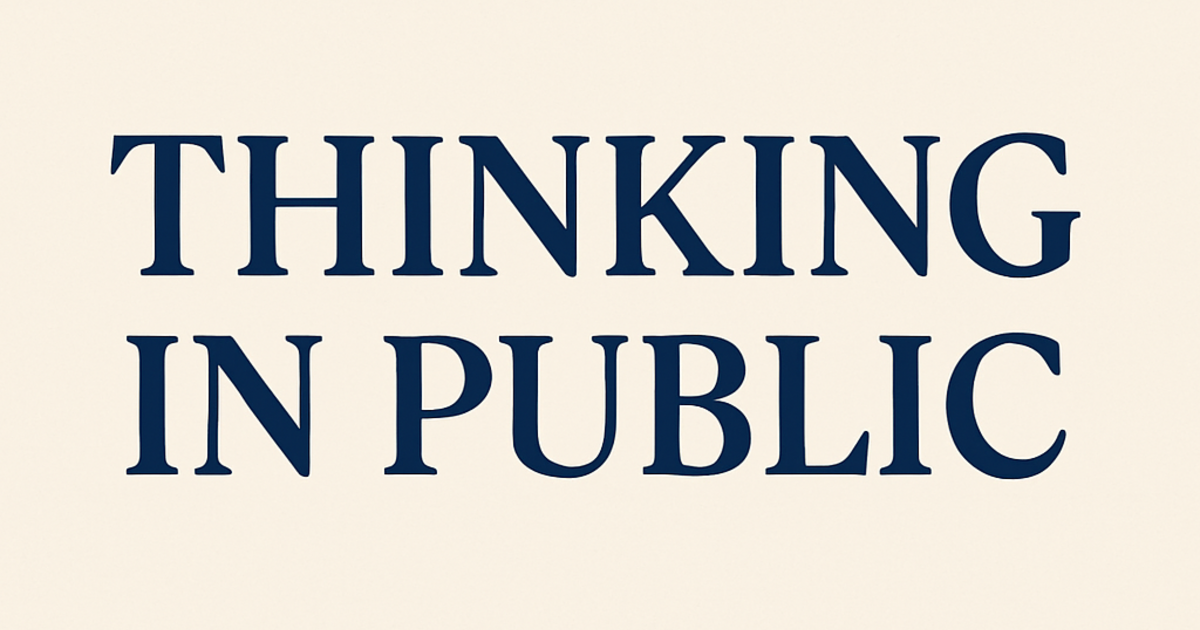The ways in which we shame ambition
Unmasking society's subtle sabotage of ambitious dreamers: how we unconsciously discourage potential innovators and limit our collective capacity for transformative change.

We say we want people to do great things.
We celebrate visionaries, leaders, reformers, and builders — at least in hindsight.
But the truth is, in the present tense, we punish ambition.
We call it arrogance.
We tell people to be “realistic.”
We roll our eyes at anyone who thinks they might just change the world.
Especially if they haven’t done it yet.
It’s a cultural reflex — a quiet form of discouragement disguised as humility.
And it’s costing us dearly.
Because when you shame ambition, you don’t just keep egos in check.
You keep people small.
And small people don’t fix big problems.
The Early Signals of Ambition
Ambition doesn’t always show up as genius or confidence.
Sometimes it’s just someone who cares too much.
Who sees how broken something is and can't stop thinking about how to fix it.
Who gets obsessed with an idea.
Who stays up late designing, writing, tweaking, exploring — not because anyone asked them to, but because they can’t help it.
That’s ambition in its purest form.
Not greed. Not vanity.
Just the refusal to accept the status quo.
But most people don’t see it that way.
They say:
❝
“Who do you think you are?”
“Don’t get ahead of yourself.”
“Stay in your lane.”
And slowly, the ambitious start to shrink.
Not because they weren’t capable — but because they learned that dreaming big makes other people uncomfortable.
Why We Shame Ambition
We don’t shame ambition because it’s wrong.
We shame it because it’s threatening.
Big dreams challenge our own comfort.
They remind us of what we gave up on, or never dared to try.
They make us feel small — not because the dreamer is arrogant, but because we’ve settled.
So we mock what we fear.
We criticize what we don’t understand.
We discourage what we don’t believe we could do.
It’s not about the person aiming high.
It’s about everyone else who chose not to.
The Fallout
This matters more than we think.
Because every time someone is shamed out of their ambition, we lose something:
- A doctor who might have fixed the EMR system decides to just finish rounds quietly.
- A teacher who could have built a better learning platform keeps their worksheets to themselves.
- A student with a wild idea for public health reform gets talked out of applying for funding.
- A founder who could have reimagined healthcare stays a consultant instead.
And these losses don’t make headlines.
They’re invisible.
We never see the app that wasn’t built.
The clinic that wasn’t started.
The book that wasn’t written.
The system that stayed broken.
All because someone ambitious was told, early and often:
❝
“Don’t be so full of yourself.”
What Ambition Really Is
Ambition isn’t about thinking you’re better than others.
It’s about believing things could be better — and that you might have a shot at helping.
It’s not about dominance.
It’s about scale.
It’s the difference between saying, “I want to help one person” vs.
“I want to build something that helps a million.”
One is not better than the other — but we need both.
And we should never shame someone for wanting to help more people, solve bigger problems, or build at greater scale.
Especially not when the world is full of broken systems and untapped potential.
We Need More Ambition, Not Less
Look around.
Is the world suffering from too much visionary thinking?
Are our systems too innovative?
Are we drowning in too many good ideas?
Of course not.
What we lack isn’t humility.
What we lack is courage.
And when we shame the few people who have that courage, we guarantee that the future gets built by the least reflective, least ethical, and least careful — simply because they were the only ones who didn’t care what people thought.
Final Thought
You don’t have to be Elon Musk. Or Oprah. Or Muhammad Yunus.
But if there’s something inside you that says,
❝
“This isn’t good enough.”
“I think I could make this better.”
“Why hasn’t anyone built this yet?”
— don’t kill it.
Don’t bury it in fear or false humility.
Because ambition, when paired with principles, is one of the most powerful forces on Earth.
And if you don’t let it grow, we don’t just lose your dream.
We lose what it could have done for the rest of us.
